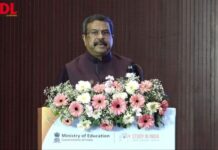
The NCERT and IIT Madras signed a Memorandum of Understanding (MoU) on Tuesday, aimed at strengthening educational research, technology integration, and teacher training, in alignment with the country’s National Education Policy (NEP). The agreement marks a pivotal collaboration between a premier education and research body and a leading technical institute.
Under the MoU, NCERT and IIT Madras will jointly develop and pilot advanced learning solutions, including AI-/ML-enabled digital tools, multilingual platforms and data analytics frameworks to enhance learning outcomes and scale successful interventions. As part of the partnership, teacher-capacity-building programmes will be expanded using state-of-the-art technological platforms, and large-scale measurement of intervention effectiveness through analytics will be enabled.
“This collaboration is rooted in our shared vision of leveraging technology, research and innovation to transform teaching and learning at scale,” said a representative of IIT Madras. “By integrating digital tools, multilingual capabilities and robust analytics under the NEP framework, we aim to create models that can be deployed broadly across states and schools.”
Raed More: Canva aims to make India its top market as the creator wave and AI boom fuel growth
Initial efforts will focus on pilot programmes across selected institutions, after which the best models will be scaled nationwide. Key focus areas of the MoU include:
- Co-creation of research and development initiatives in educational pedagogy and technology integration.
- Deployment of digital learning tools, multilingual platforms, and AI/ML frameworks to support teacher training and student learning.
- Implementation of data analytics systems to measure learning outcomes, improve interventions and enable evidence-based scaling.
By pooling NCERT’s national reach and domain expertise with IIT Madras’ technology and research capabilities, the partnership is expected to accelerate innovation in school-level education, enhance teacher effectiveness, widen access to digital learning, and support the NEP’s objective of fostering skilled, inclusive, technology-infused education.



















